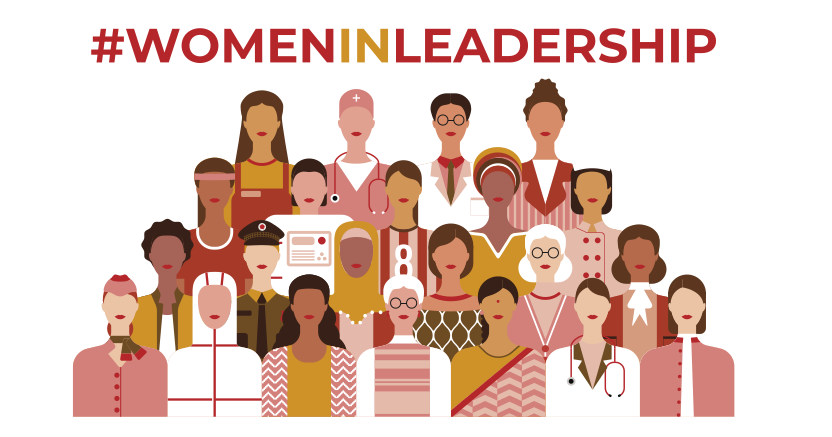Ana Valado
The issue of gender equality is on the agenda and is currently one of the major challenges facing organizations.
There is still a long way to go but Europe seems to be on the right track. Women are still under-represented in the decision-making process but the number of women in leadership positions in governments and international organisations has been increasing in recent years. Angela Merkel, Christine Lagarde or Ursula von der Leyen are no exception.
In the list of the 100 Most Powerful Women in the World, compiled by Forbes magazine, these three women come in first, second and fourth places, respectively.
Heading the government for 15-years now, German Chancellor Angela Merkel is among the female leaders who have remained in office for longer periods.
French citizen Christine Lagarde was appointed to the presidency of the European Central Bank on 1 November 2019 and is the first female president of this Bank since it was established in 1998.
Ursula von der Leyen, also of German nationality, was appointed president of the European Commission in December 2019, thus becoming the first female president of the Council.
It is also worth highlighting, as regards female leadership, Nigerian Ngozi Okonjo-Iweala, who recently took the position of Director-General of the World Trade Organization (WTO) and the first woman and first African in this position, European Commissioner for Competition, Margrethe Vestager and Bulgarian Kristalina Georgieva, the first person from an emerging country to head the International Monetary Fund (IMF).
Northern Europe is the region of the globe with the highest number of women in top government positions. Countries like Finland, Denmark, Estonia, Lithuania, Norway and Iceland have Ladies Prime Ministers.
Also in Scotland, Nicola Sturgeon has been in office as prime minister of the country since November 2014, the first woman to take this position.
All of them are strong-minded women, with a firm hand and who want to ensure female participation in democratic power and equal opportunities in leadership, at all levels of decision-making.
On the following pages, PRÉMIO magazine gives you a brief profile of Women in top leading roles in Europe, showing that the most difficult is to take the first position at the top of an organization and once they manage this no-one stops them.
ANGELA MERKEL
CHANCELLOR OF GERMANY
CHANCELLOR OF GERMANY
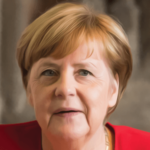
Angela Merkel was elected for the 10th consecutive year and is the most powerful woman in the world in the ranking compiled every year by Forbes magazine.
She is 66 of age, married and was born in Hamburg, West Germany. But a few months after she moved with her family to Templin, a region in the eastern part of the country and grew up under the communist regime in East Germany.
Merkel has a degree in physics and a PhD in quantum physics, which has surely contributed to her pragmatic and strategic vision of important topics.
She arrived at the Bundestag, the German parliament, in 1990. Eight years later she became secretary-general of the Christian Democratic Union (CDU) and, in 2005, she was elected chancellor of Germany, becoming the first woman to lead the German government. She is currently serving her fourth term.
For almost 16 years in office now, the German head of government faced a global financial crisis in 2008, the threats of European Union break-up, the big wave of migrations in Europe in 2015 and, recently, the Covid-19 pandemic.
When, in 2008, the economic and financial crisis broke worldwide, Angela Merkel was the main advocate and engineer of the recovery plan and aid policies to the different EU countries, consolidating her image as one of the main world leaders.
IN NOVEMBER 2018, MERKEL RESIGNED AS
LEADER OF THE CHRISTIAN DEMOCRATIC
UNION AND ANNOUNCED THAT SHE
WOULD NOT RUN FOR ANOTHER TERM AS
CHANCELLOR IN 2021
2015 was one of the most remarkable years in Merkel’s office, marked by the influx of more than one million refugees in Germany, most of them from Syria, Afghanistan and Iraq. In order to respond to this, the German Chancellor changed Germany’s immigration laws, adopting an open-door policy.
The management of the current crisis caused by the covid-19 pandemic deserves also a positive note as regards the mandate of the German leader, of which it’s worth highlighting the speed and flexibility of Merkel when it comes to making decisions, despite the difficulties in getting all sixteen federal states’ agreement.
In November 2018, Merkel resigned as leader of the Christian Democratic Union and announced that she would not run for another term as chancellor in 2021.
Her political image has changed over the nearly 16 years of her office and Merkel will come down in history as the leader in woman-suit, hands in a triangle and for her clear and concise speech. Those who know her well recall her particular sense of humour, despite her image of an austere and relentless politician.
CHRISTINE LAGARDE
PRESIDENT OF THE ECB
PRESIDENT OF THE ECB
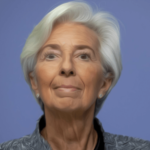
Christine Lagarde is the current President of the European Central Bank (ECB) and the first woman to take this position, after being also the first woman at the helm of the International Monetary Fund (IMF) in 2011.
President of the European Central Bank since November 2019, after Mario Draghi, Lagarde is considered the second most powerful woman in the world, according to the Forbes magazine ranking, for the second consecutive year.
She was born in Paris in 1956, is divorced and she has two children. She graduated in law at the University of Paris and took a master’s degree in political science in Aix-en-Provence, in the south of France.
She began practising law in 1981 at the international law firm Baker & McKenzie where she worked as an expert in labour issues, competition and mergers and acquisitions. Over time, she moved up the hierarchy of this law firm and in 1995 she joined the Executive Board, becoming, four years later, the first female president of Baker & Mckenzie.
Christine Lagarde started a political career between 2005 and 2011 and she was minister of the French government in the areas of Foreign Trade, Finance, Industry, Agriculture and Fisheries and Employment.
LAGARDE IS CONSIDERED THE SECOND
MOST POWERFUL WOMAN IN THE
WORLD, ACCORDING TO THE FORBES
MAGAZINE RANKING, FOR THE SECOND
CONSECUTIVE YEAR
In 2009, the Financial Times daily newspaper considered her the best finance minister in Europe. While in office as Finance minister, she chaired Ecofin in the second half of 2008 and later G20 during the French presidency in 2011.
After six years in government positions, in 2011 Christine became director-general of the IMF and her main challenge was reversing the instability Europe’s economic crisis was causing at the time. At the end of her first five-year term at the IMF, after acting in the first line of management of the debt crisis in the Eurozone, she was re-elected by consensus for a second term.
With an unmistakable presence, with an assertive speech and a refined and elegant style, Lagarde is acknowledged for her ability to generate political consensus, think “outside the box” and influence those around her, something she did prove when she headed the IMF.
As the person in charge of the monetary policy of the Eurozone, Christine Lagarde is concerned about the economic recovery in Europe, following the most recent wave of Covid-19 pandemic.
URSULA VON DER LEYEN
PRESIDENT OF THE EUROPEAN COMMISSION
PRESIDENT OF THE EUROPEAN COMMISSION
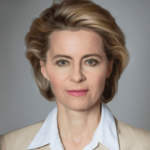
Belgian, polyglot, graduated in medicine, mother of seven and pro-European, Ursula von der Leyen was appointed President of the European Commission in 2019 for a term that will end in 2024.
Jean-Claude Juncker’s successor at the head of the European Commission is also the first woman appointed for this position, coming in 4th place in the ranking of the most powerful women in the world compiled by Forbes magazine.
Ursula von der Leyen, 63, was born in the Belgian capital. She graduated in Medicine in 1980, after giving up the Economics course she was taking.
But politics was always in her blood, influenced by her father, a politician, and in 2000 she was elected representative of the Christian Democratic Party (CDU) in the Hanover regional assembly.
She served in the German federal government between 2005 and 2019 and she is the member of government who served more time in Merkel’s government, as Minister for Family and Youth Affairs (2005-2009), Minister for Labour and Social Affairs (2009-2013) and the first woman to take the office of Minister of Defence (2013-2019).
URSULA VON DER LEYEN RECENTLY
ANNOUNCED THAT PART OF THE RECOVERY
FUND CREATED TO ADDRESS THE
ECONOMIC CONSEQUENCES OF THE CRISIS
GENERATED BY THE COVID-19 PANDEMIC,
THE SO-CALLED “NEXT GENERATION EU”
She is also vice president of the Christian Democratic Party (CDU) since 2010 and a member of the European People’s Party. For many years, she was seen as the person who might succeed Merkel.
The President of the European Commission highlights the fight against climate change, the digitisation of the economy and stability as flags for her mandate.
One of Ursula von der Leyen’s priorities is the environment and she recently announced that part of the Recovery Fund created to address the economic consequences of the crisis generated by the Covid-19 pandemic, the so-called “Next Generation EU”, will be allocated to the issue green bonds.
Another portion of this sum shall be allocated to digital innovation, considering that during the lockdown and in light of the technological means available we have undergone more digital transformations than normal in years.
NGOZI OKONJO-IWEALA
DIRECTOR GENERAL OF THE WTO
DIRECTOR GENERAL OF THE WTO
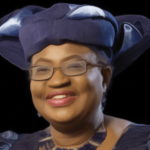
Former Nigerian Finance Minister, Ngozi Okonjo-Iweala recently became the first woman and the first African woman to take over as director-general of the World Trade Organization (WTO), succeeding Brazilian Roberto Azevêdo, who left office in August.
Okonjo-Iweala is 66 years old, has a degree in Economics from Harvard University and is an expert in Public Finance. She was director of operations for the World Bank, where she worked for 25 years as development economist and she even ran for the position of president of this bank in 2012. She was also the first woman to head the Ministry of Finance in Nigeria, a position she held twice (2003 to 2006 and 2011 to 2015). In 2006 she was also Minister of Foreign Affairs.
This economist took office on March 1 and her term ends on August 31, 2025. Despite the many challenges she has to address, such as the tension between the United States and China, trade disputes between the United States and Europe, the reform of this organisation and the recovery of the global economy, her major concern in the short run is working with WTO members to address the economic and health consequences of the pandemic.
NGOZI OKONJO-IWEALA RECENTLY
BECAME THE FIRST WOMAN AND THE
FIRST AFRICAN WOMAN TO TAKE OVER AS
DIRECTOR-GENERAL OF THE WORLD TRADE
ORGANIZATION (WTO)
Ngozi Okonjo-Iweala led the Global Alliance for Vaccines (GAVI) until 31 December last year, whose aim is to ensure that developing countries have the necessary access to vaccines against Covid-19. Also, she was the African Union special envoy to mobilise international financial support in the fight against the pandemic and a special envoy of the World Health Organization in the “ACT Accelerator” initiative seeking global access to the development of treatments, diagnoses and forms of prevention Covid-19.
In her opinion, and as she explained in the April issue of American Foreign Affairs magazine: “One way to ensure a sufficient supply of vaccines and their equitable distribution is to remove some barriers imposed by laws on intellectual property and technology transfer”.
Her unmistakable style with turban, necklace, earrings and printed cotton dress is one of the characteristics of the current head of this organization which acts as the forum for multilateral negotiation dealing with the rules of global trade.
MARGRETHE VESTAGER
EUROPEAN COMMISSIONER FOR COMPETITION
EUROPEAN COMMISSIONER FOR COMPETITION
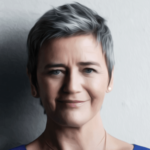
Margrethe Vestager is the European Commissioner for Competition since 2014. In her role as European Commissioner, Vestager regulates commercial activity across the European Union, making her one of the most influential political figures in Europe. Her self-determination is shaping the way technology is used around the world and the biggest international technology companies have already witnessed the Danish woman’s power.
She challenged Google, Apple and Amazon and confronts any company circumventing business rules in Europe. One of her most controversial decisions was to request Apple to pay € 13 billion in unpaid taxes in Ireland in 2016.
Born in 1968 in Denmark, she is married and has two daughters. She studied Economic Sciences at the University of Copenhagen. She was Minister of Education of Denmark between 1998 and 2001. She was the leader of her party between 2007 and 2014 and became Minister of Economic and Internal Affairs in 2011.
IN HER ROLE AS EUROPEAN
COMMISSIONER, VESTAGER REGULATES
COMMERCIAL ACTIVITY ACROSS THE
EUROPEAN UNION, MAKING HER ONE
OF THE MOST INFLUENTIAL POLITICAL
FIGURES IN EUROPE
In a few years, Vestager became one of the most charismatic political figures in her country, having managed to pass some complicated measures, such as a tough social security savings package that included reducing the number of years of unemployment benefits. She became so famous in those years that she was the inspiration for the main character of a television series.
As she concedes, “In politics we need to make difficult decisions and we can never please everyone”.
She is considered the most powerful ‘trustbuster’ in the rich world and referred to by many as the “tax lady”.
KRISTALINA GEORGIEVA
DIRECTOR-GENERAL OF THE IMF
DIRECTOR-GENERAL OF THE IMF

Bulgarian economist Kristalina Georgieva is the first person from an emerging country to head the International Monetary Fund (IMF), having moved from the World Bank, replacing Christine Lagarde in office.
Georgieva was the only candidate and profited from a change in the IMF statutes regarding the age limit thus making her application valid. Her term of office began in October 2019 and has a duration of five years.
Georgieva is 67 years old and a native of Sofia, Bulgaria, having completed her academic studies in economics and administration. She is married and has a daughter. Between 1993 and 2010, she held several positions at the World Bank and she climbed to the vice-presidency in March 2008. She stood out, among other things, for her struggle as regards gender parity. She served as vice-president of the European Commission, during Jean-Claude Juncker’s term in office, between 2014 and 2016. In September 2016, she ran for the position at the head of the United Nations, supported by German Chancellor Angela Merkel.
THE IMF DIRECTOR-GENERAL’S TOP
MISSION IS TO RECOVER FROM THE
PANDEMIC AND SHE SINGLES OUT THREE
ISSUES THAT HAVE TO BE THERE TO
ACHIEVE THIS: PRUDENCE IN ECONOMIC
POLICIES AND INSTITUTIONS, SOUND
INVESTMENT IN PEOPLE AND A FOCUS
ON THE ISSUE OF CLIMATE CHANGE
Kristalina Georgieva recebeu várias distinções, das quais se destacam, em 2010, a nomeação para o “European of the Year” (prémio atribuído para honrar cidadãos Europeus que mais influenciaram a agenda legislativa e política europeia) e “EU commissioner of the Year”, como um reconhecimento pelo seu trabalho, em particular, na sua acção nos desastres humanitários do Haiti e Paquistão.
A líder búlgara assumiu o comando do FMI numa altura em que a guerra comercial entre os Estados Unidos e a China começou a ameaçar o crescimento global. Na altura, conforme referiu, a sua grande prioridade na liderança do FMI era ajudar os países membros a minimizarem o risco de crise e a prepararem-se para enfrentar a desaceleração económica.
Neste momento a grande missão da directora-geral do FMI é a recuperação da pandemia, para a qual aponta três necessidades: a prudência nas políticas económicas e nas instituições, a solidez no investimento em pessoas e a concentração na questão das alterações climáticas.
Prime Ministers
METTE FREDERIKSEN
PRIME MINISTER OF DENMARK
PRIME MINISTER OF DENMARK
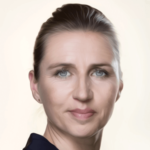
In June 2019, the leader of the Social Democrats became head of the government, the youngest and second female prime minister in the history of Denmark, after Helle Thorning-Schmidt, also a Democrat, who ruled between 2011 and 2015.
Born in Aalborg, in northern Denmark, Frederiksen is 43 years old, is in her second marriage and has two children. She graduated in Administration and Social Sciences, at the University of Aalborg, in 2007, and two years later she took a master’s degree in African Studies at the University of Copenhagen.
In addition to a brief stint at the Confederation of Trade Unions, Mette Frederiksen spent her entire career in politics. Affiliated with the Social Democratic Party, she is a member of Folketing, the parliament of Denmark, since 2001, and served in the government of Helle Thorning-Schmidt as Minister of Employment from 2011 to 2014, and as Minister of Justice from 2014 to 2015. On 28 June 2015, she succeeded Thorning-Schmidt as the leader of the Social Democrats.
In 2019, after winning the legislative elections without an absolute majority, she managed to form a government after 20 days of negotiations with the support of the Popular Socialist Party, the Social Liberal Party and the Red and Green Alliance.
One of the flags of this government was to reduce carbon dioxide emissions by 70% in Denmark over the next decade.
NICOLA STURGEON
PRIME MINISTER OF SCOTLAND
PRIME MINISTER OF SCOTLAND
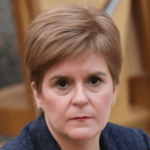
Nicola Sturgeon has been Scotland’s prime minister since 2014, the first woman to take this position since the creation of the Scottish parliament and government in 1999, and she is also the leader of the Scottish Nationalist Party (SNP).
She graduated in Law from the University of Glasgow and she is a true pure producte of Scotland’s autonomy. Her political aspirations emerged at an early age. She joined the SNP in 1986 when she was 16 years old. In 2004 she became Scotland’s deputy prime minister under Alex Salmond and she was one of the leading pro-independence figures in the referendum in favour of the UK’s separation in 2014. In November this year, Salmond announced that he would resign and Nicola was the only candidate to succeed him.
Nicola Sturgeon was born in 1970 in Irvine, Scotland, she is married and has no children.
In an interview with BBC News in May 2017, the Scottish prime minister answered some questions about her personal life. When asked about her favourite vacation destinations, Sturgeon mentioned Skye in Scotland and Portugal when it comes to travel abroad.
KAJA KALLAS
PRIME MINISTER OF ESTONIA
PRIME MINISTER OF ESTONIA
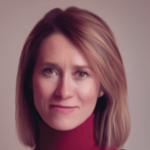
Kaja Kallas came to power in January this year, after the resignation of Juri Ratas which meant the end of the ruling coalition led by the Centre Party. Upon taking office as the first woman at the helm of the Estonian government, Kallas not only announced her intention to “rebuild relations with neighbours and allies and recover the image of a good country to invest in” but made a point of underlining that with a parity-based government she wanted to “find the balance between men and women, between experience and novelty”.
At the moment, Estonia is the only country in the world to have an elected woman as head of government and head of state.
Born in Tallinn, Estonia, Kallas is 43 years old, married and has three children. She graduated from the University of Tartu in 1999 with a Bachelor in Law. From 2007, she attended the Estonian Business School, taking an EMBA (Executive Master of Business Administration) in Economics in 2010.
The head of government has been a leader of the Reform Party since 2018 and a member of Riigikogu, the Estonian parliament, since 2019 and previously from 2011 to 2014. She was also an MEP between 2014 and 2018, representing the Alliance of Liberals and Democrats for Europe.
This leader of the Reform Party is known for her pro-European positions.
SANNA MARIN
PRIME MINISTER OF FINLAND
PRIME MINISTER OF FINLAND
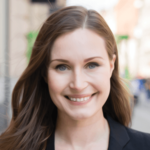
When she took office as Prime Minister of Finland in December 2019, Sanna Marin hit the news all over the world, not only because she is a woman, but because she is the third woman to be elected as head of the government in the country and mainly given the fact that, at the age of 34, she became the youngest head of government in the world.
Raised in what she calls a “rainbow family” by her mother and her female partner, Marin is married and has a daughter.
Ecologist, vegetarian, feminist and advocate of equality policies are some of the characteristics of this young policy.
She graduated in Administrative Sciences from the University of Tampere, having been the first person in the family to go to university.
In 2005 she came to politics. In 2007 she applied unsuccessfully for the position of Mayor of Tampere. Five years later, in 2012, she won. In 2015 she became a member of parliament, climbing the structures of the Social Democratic Party (SDP) until she reached the party’s vice presidency in 2017. She was Minister of Transport and Communications in 2019, for six months, the exact same duration as the government.
KATRÍN JAKOBSDÓTTIR
PRIME MINISTER OF ICELAND
PRIME MINISTER OF ICELAND
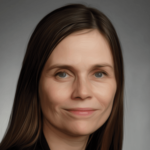
Iceland is no exception in this tradition of female power. The country which had the first female president in Europe and the World, Vigdís Finnbogadóttir in 1980, has since 2017 Katrín Jakobsdóttir as head of the government, the second woman to take this office in the country.
Feminist, an environmentalist, social democratic, anti-militarist and with an agenda strongly based on gender equality, Katrín was born in Reykjavík, capital of Iceland, is 45 years old, married and has three children.
She graduated from the University of Iceland in 1999, holds a degree in Icelandic and French and in 2004 she took a master’s degree in Arts at the same University.
She began her political career at the age of 27 and she became vice president of the Green Left Movement in 2003 and later president, a position she held until her election as prime minister. She was Minister of Education, Science and Culture, between 2009 and 2013, and where she developed an innovative policy aimed at boosting the creative industry in order to counter the effects of the economic crisis. Among her actions, she used tourism as a means to restore economic balance and help to reduce the rate of unemployment in the country.
As prime minister, she was in charge of passing a set of laws to reduce the gender pay gap, ensure better representation of women at the top of companies and ensure shared and paid maternity and paternity leave.
INGRIDA SIMONYTE
PRIME MINISTER OF LITHUANIA
PRIME MINISTER OF LITHUANIA

Lithuanian Ingrida Simonyte was elected Prime Minister of Lithuania in December 2020 and she promised to put more women in power in this former Soviet republic from the beginning, perhaps because she succeeded one of the few 100% male European executives
At the age of 46, Simonyte graduated from Vilnius University, her hometown, in Business Administration in 1996, having subsequently completed her master’s degree in 1998.
She started her career as an economist and civil servant, working as head of the fiscal division of the Ministry of Finance until 2004. In 2009 she was appointed Minister of Finance, with the task of stimulating Lithuania’s economy after the Great Recession and resigned in 2012. Subsequently, she was appointed vice-chairman of the board of the Bank of Lithuania.
She returned to politics in 2016, she ran as an independent candidate in general elections and won a seat in parliament. In 2018, Simonyte announced her campaign in the 2019 presidential election, where she was defeated in the second round.
She was re-elected to parliament in the 2020 elections, where the Lithuanian Christian Democratic Union (HU-LCD) won a plurality of seats.
ERNA SOLBERG
PRIME MINISTER OF NORWAY
PRIME MINISTER OF NORWAY
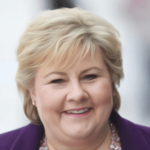
Erna Solberg became Prime Minister in October 2013, and she is now on her second term.
She is the second woman to lead a Norwegian government, after Gro Harlem Brundtland (who served three terms between 1981 and 1996).
Also known as “Iron Erna” given her firm hand and the manner how she has conducted the country’s policy, she is often equated with the British Margaret Thatcher, a.k.a. the “Iron Lady”, the prime minister with the longest term in office in the twentieth century and the first woman to take this position.
At the age of 59, she was born in Bergen, Norway, she is married and has two children. She graduated in Political Science and Economics in 1986 from the University of Bergen. In her final year, she also led the Students’ League of the Conservative Party in Bergen.
Solberg started her career young and at the age of 28, she was elected to parliament. She has been a leader of the Conservative Party since 2004, she combines a balanced fiscal conservatism with a humanist social policy, ensuring that: “gender equality is essential to achieve a sustainable recovery” from the crisis caused by the covid-19 pandemic.
Former girl scout and football fan, she uses sport as diplomacy, and she usually takes a ball with her to international meetings.
The education and well-being of women in poor countries are one of Solberg’s flags.
